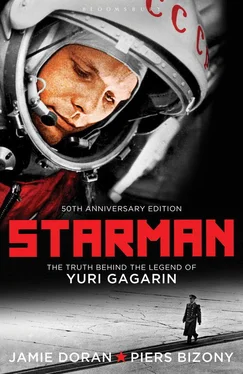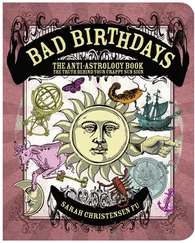Titov and several of the other cosmonauts from the first group attended the celebrations in plain clothes. They did not get to stand on top of Lenin’s Mausoleum alongside Gagarin and the top brass, but had to stay at ground level. ‘I saw this sea of people, not a sea but an avalanche of shouting, smiling people. They were lifting children onto their shoulders to let them have a look. Yura was standing on the Mausoleum among the government members,’ says Titov. ‘It was astonishing to see him there. It was only then I realized the importance of the event which had moved all the people. Everyone was glad. The whole world was glad because a man had gone into space. It was extraordinary.’
Gagarin made a speech from the podium: the usual sentiments that one would expect on such as occasion, but delivered with his own particular cheerfulness and sincerity, so that all the platitudes about communism, the Motherland, the Party, seemed for a moment genuinely to come alive. In conclusion Gagarin said, ‘I should like to make a special mention of the fatherly love shown to us, the Soviet people, by Nikita Sergeyevich Khrushchev… You were the first to congratulate me warmly on the success of the flight a few minutes after I landed… Glory to the Communist Party of the Soviet Union lead by Nikita Sergeyevich Khrushchev!’
Lest any of his enemies be waiting in the wings for signs of weakness, Khrushchev flaunted his invincibility, his intimate connectedness with today’s triumph. Gagarin’s speech of gratitude – delivered with tact and sincerity to an immense and exultant crowd – was precisely what the First Secretary wanted to hear. The young cosmonaut became a firm political favourite from that moment. Bursting with pride and happiness and wiping tears of joy from his eyes, Khrushchev repeatedly hugged Gagarin, then made a hefty speech, to which the crowd listened with rapt attention, interrupting him at frequent intervals with long bursts of heartfelt applause.
One has to imagine that on April 14, 1961 the Soviet Union truly believed in itself, in no small part because Khrushchev understood how to win the loyalty of his people with an ebullient brand of showmanship. For now, at least, the blood-soaked struggle of the socialist revolution seemed to have taken flight under his more optimistic style of leadership. Joseph Stalin had instilled obedience on pain of death, but Khrushchev was immeasurably less terrifying in his desire for affection won without duress. On coming to power he had gone so far as to denounce Stalin’s cruelties. This was a tremendous political risk, given that many surviving administrators from the old regime were still pulling the Party strings and did not want to be told that their travails under Stalinism had amounted to a terrible mistake; but today, with Gagarin’s world-shattering achievement under his belt, Khrushchev was unassailable. For now. [10] See Lynch, Michael, Stalin and Khrushchev: The USSR, 1924–64 , London: Hodder & Stoughton, 1996, pp. 96–102.
Of course the young man who had helped deliver him this wonderful victory would benefit from the First Secretary’s warmest and most personal gratitude in the coming months and years. Unfortunately, winning Khrushchev as a friend also meant gaining his rivals as enemies. When Khrushchev’s deputy Leonid Ilyich Brezhnev congratulated Gagarin at Vnukovo Airport and treated him as a lofty equal atop the Mausoleum in Red Square, he did so with all due comradeship and sincerity, but his body language – preserved in the documentary films of the event – betrays his lack of real warmth. In October 1964 his deference towards the First Cosmonaut would vanish overnight, along with Khrushchev’s hold on power.
In the evening there was a celebratory dinner in the huge Georgyevsky Hall of the Kremlin. It was supposed to have been a luncheon, but the Red Square celebrations had lasted for a good six hours. The crowds’ enthusiasm and proud patience seemed limitless, and Khrushchev had milked the day for all its glory.
At the dinner, a hungry and footsore Valentin tucked into all the food and booze with hearty enthusiasm. ‘There was a huge round table – an entire delicatessen, I would say. Yura was awarded a Golden Star and the Order of Lenin. The last people to congratulate him were the holy fathers. There was one of ours, two Muslims, and a couple of others. One of them asked, “Yuri Alexeyevich, did you see Jesus Christ far up above the earth?” He replied, “Holy father, you’d know better than me whether I’d have seen him up there.”’
Valentin noted to his satisfaction that sensible supplies of good vodka accompanied all the place settings, for the men at least. ‘There was a bottle of Stolichnaya by everyone’s side – not the modern stuff, but the kind you drink and then want to drink more of. There was also cognac, wine, and three glasses. I wasn’t sure which glass to take, so I decided to copy Father. He took the middle one and I did the same. When I’d drunk from the glass, I asked, “How much are non-Party members allowed to drink?” Everyone went quiet. Only then did I realize my mistake. Father replied, “That’s right, Valentin Alexeyevich. These days, Party members get to drink twice as much as non-members!” Everyone started to laugh and the tension disappeared.’
Valentin had another tot to recover from his embarrassment, and kept an amused eye on a group of Muslim delegates from the southern republics. ‘You know, they were especially drunk. They have total abstinence, don’t they? But here the drink was free of charge. They were great fun, and so were the Yugoslavs. The Poles also drank quite well. Some people were carried out by their elbows and put in their cars.’
Unfortunately, getting at the food was more of a problem than obtaining drink. ‘There were no waitresses to serve us. So it was just like communism. You can sniff it and look at it, but you can’t touch it or eat it. Furthermore, Khrushchev was shouting all the time that true universal communism was just on the horizon.’
Indeed, a triumphant Nikita Khrushchev was by now well into one of his noisy table-thumping routines. Cosmonaut Alexei Leonov recalls the mood of optimism. ‘He announced that our generation was going to live in true communism. We were all hugging, applauding, screaming “Hooray!” And we really believed him, because at that time the success of our country was obvious to the whole world. It was only much later, when we grew up and learned a little about economic realities, that we realized Khrushchev’s announcement was a little premature.’
By the end of April Gagarin’s arduous routine of foreign travel was under way, with a trip to the ‘democratic’ satellite socialist countries of Czechoslovakia and Bulgaria, then on to Finland. In June 1961 he arrived back in Moscow for some much-needed leave with Valya and the children, although he took the time to be interviewed by yet more journalists, ferried from place to place as always by his driver Fyodor Dyemchuk. The Indian writer Khwaja Ahmad Abbas observed of Gagarin:
He was widely hailed as the Man of the Moment, but when I came face-to-face with him the meeting began with an anticlimax. The door opened and the world’s most publicized man stepped in, but I failed to recognize him. Even while shaking hands with him I was uncertain that this slightly built young man could be the great Hero of the Space Age. Even in his smart uniform he looked like a junior officer coming in as an advance guard to announce the real hero. [11] Golovanov, Our Gagarin , pp. 191–2.
As usual, Gagarin’s charm quickly won the day and Abbas’s approach soon became more complimentary. The journalist may have felt an initial twitch of disappointment, but the First Cosmonaut’s essential normality was the whole point. If Khrushchev and his advisors had wanted a super-hero to represent the Soviet Union in space, they would have chosen another candidate.
Читать дальше












